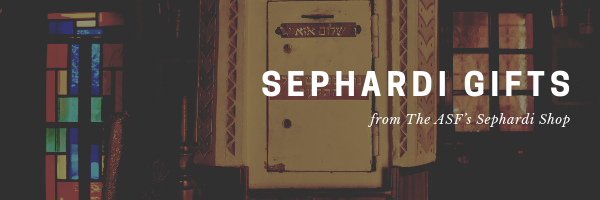“Sephardi House was overjoyed to once again partner with Cornell Hillel’s Sephardi Mizrahi Student Council on the 2022 Sephardi Mizrahi Shabbaton. Attracting hundreds of students, the 3-day multifaceted program was a huge success, which will inspire other campuses across the nation. We are very proud of the partnership that Sephardi House, under the aegis of the American Sephardi Federation, has established over the past three years with Cornell Hillel and its Sephardic and Mizrahi student leaders—six of whom have been part of our national Sephardi House Fellowship. This landmark event, featuring performances by ASF Broome & Allen Fellows Dr. Samuel Torjman Thomas’ Asefa, exemplifies our mission of helping students discover Sephardic and Mizrahi heritage to enrich all Jewish students and the broader campus community. The event also underscored Sephardi House’s robust Campus Partnership program and growth potential in its inclusive vision of Jewish Peoplehood.” ~ Joshua Benaim (visionary founder of Sephardi House) and Ruben Shimonov (the ASF’s National Director of Sephardi House & Young Leadership)
The Sephardi World Weekly is made possible by Professor Rifka Cook, Maria Gabriela Borrego Medina, Rachel Amar, Deborah Arellano, and Distinguished ASF Vice President Gwen Zuares!
Click here to dedicate a future issue in honor or memory of a loved one
🧬“Uncovering my Mizrahi and Sephardi Roots”
By E.S. Danon, Jewish Women’s Archive
Sephardi House Fellow E.S. Danon with “Sara Cohen, a second cousin she met through genetic testing, holding her grandparents’ wedding photo”
(Photo courtesy of E.S. Danon/Jewish Women’s Archive)
Georgetown University’s E.S. Danon shares the ways in which the ASF’s Sephardi House has enriched her Jewish identity. To begin with, Sephardi House provided basic knowledge: “During this year-long fellowship, I learned about all things Mizrahi and Sephardi—something that had been missing from my experiences with Jewish groups up to that point.” The program also provided tools to become, in turn, an educational leader: “With mentorship from Sephardi House national director, Bukharian Jew Ruben Shimonov, I hosted a three-part webinar series on the Jews of South Asia.” And, most importantly, the program created a community: “I met fellow Sephardi and Mizrahi students from all over the country. Our cohort’s Shabbaton was the first time I had ever been in a room with so many people of similar backgrounds, outside of synagogue.”
See also: “Enlightening & Empowering Jewish Students on Campus” (Sephardi Ideas Monthly)
Feature: Itamar Borochov’s “Blue Nights” 🎷🎶
The Itamar Borochov Quartet performing at “Straight Ahead: An Omni-American Future, Fighting Bigotry Together” the 2nd annual event organized by the Jazz Leadership Project, American Sephardi Federation, and Combat Antisemitism Movement, Minton’s Playhouse/The Cecil in Harlem, 28 November 2022
(Photo courtesy of the New York Social Diary)
Celebrated Jazz bandleader, trumpeter, composer, and friend of the ASF, Itamar Borochov, sets the mood with the feathery introduction, deep groove, and then ecstatic release of “Blues Nights” from the award-winning 2021 album of the same name.
🙌“The Sage and Scribe of Modern Israel”
By Ruth R. Wisse, Mosaic Magazine
Rabbi Haim Sabato
(Photo courtesy of Haaretz)
Ruth Wisse celebrates the work of the Israeli writer “Ḥaim Sabato, born 70 years ago in Cairo, Egypt, but descended from a long line of rabbis whose home was in Aleppo, Syria.” Along the way, Wisse compares and contrasts Sabato with one of his heroes, the great Hebrew novelist Shai Agnon (1888-1970). Both Sabato and Agnon “are steeped enough in traditional Jewish learning to draw effortlessly in their work upon tales and teachings that reach all the way back… to Sinai… They are thus sages and novelists in one…” The main difference for Wisse is the different spirit, or “vibe,” animating their works, “(I)n my decades of studying the Yiddish and Hebrew literature of Europe, I had never once thought or been reminded of adjectives like serene, let alone the aura of Sabbath-restfulness invoked by the very name Sabato.” Where does Wisse locate the source of this serenity? Cultural self-confidence: “European Jews discovered ‘enlightenment’… in what seemed to them the more highly developed surrounding cultures… The Jewish writer in the Arab world experienced no such inferiority.”
See also:
- Haim Sabato’s Classic Sephardi Sensibility (Sephardi Ideas Monthly)
- Rabbi Daniel Bouskila’s articles in the Sephardi World Weekly: “Agnon’s Days of Awe, Casablanca’s Jewish Heritage, & Gaza’s Great Payytan” and “Antisemitism at NYU, Bouskila’s Burnt Tefillin, & Conserving Kurdish Jewry”
~~~~~~~
From Generation to Generation: a Legacy of Faith and Tolerance
By David S. Malka
From Generation to Generation: a Legacy of Faith and Tolerance is dedicated to the memory of Rabbi Shlomo Malka. It honors his memory as a Jewish scholar, a spiritual leader, and a great humanitarian.
David S. Malka is publishing this text as his personal contribution to legacy of Malka family, in the hope that this generation will re-discover their patriarch's teaching and advance his message of faith and compassion on to the next generation.
From Generation to Generation: a Legacy of Faith and Tolerance is a message of love, tolerance, and pride in one's heritage.
The Aristocrat: The Life and Legacy of Hillel Menashe Sutton
By Abraham Sutton
With this memoir, a tribute to the memory of his father, Abraham (Al) Sutton presents a brief synopsis of the history of the Jewish community of Aleppo, Syria, up to and through its diasporas to Tel Aviv, Jerusalem, New York, New Orleans, and Deal, New Jersey. All this in a thin volume generously laced with photographs. Al Sutton lost his father when he was only eleven years old. He thought he knew him; but one day he discovered that there had been a eulogy by a renowned kabbalist. He eventually found the text; what he discovered in the process provides the foundation of The Aristocrat. The book is interesting, fast moving, and sparkles with little glimpses of everyday life in a land (Aleppo) that was continuously inhabited by Jewish people from Biblical times until the late 20th century. There are also scenes of Israel during the War of Independence, and Syrian Jewish life in the United States. Author’s notes, bibliography.
~~~~~~~
Upcoming Events or Opportunities
ASF Broome & Allen & ADL Collaborative for Change Fellow Isaac de Castro presents:
Entre Diasporas: Telling the Latin-American Jewish story. Contando la historia judía latinoamericana
Tell your story. Cuenta tu historia.
We’re looking for first-generation Latino Jews in the United States who immigrated because of political and social turmoil. Jews of Sephardic descent from Colombia, Cuba, and Venezuela that now reside in the Miami area will be given priority, but others are welcome to apply as well.
Fill out this form to be considered as an interviewee for this project. After you’ve submitted, we will be in touch promptly to set up a preliminary phone call.
Click here for more information.





